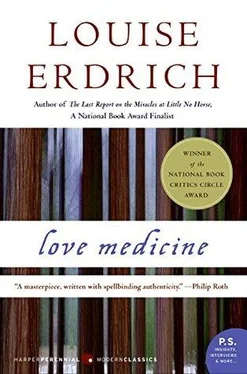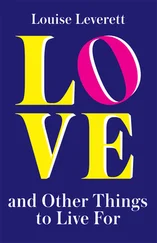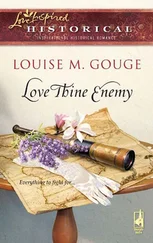Louise Erdrich - Love Medicine
Здесь есть возможность читать онлайн «Louise Erdrich - Love Medicine» весь текст электронной книги совершенно бесплатно (целиком полную версию без сокращений). В некоторых случаях можно слушать аудио, скачать через торрент в формате fb2 и присутствует краткое содержание. Год выпуска: 2005, Издательство: Harper Perennial Modern Classics, Жанр: Современная проза, на английском языке. Описание произведения, (предисловие) а так же отзывы посетителей доступны на портале библиотеки ЛибКат.
- Название:Love Medicine
- Автор:
- Издательство:Harper Perennial Modern Classics
- Жанр:
- Год:2005
- ISBN:нет данных
- Рейтинг книги:3 / 5. Голосов: 1
-
Избранное:Добавить в избранное
- Отзывы:
-
Ваша оценка:
- 60
- 1
- 2
- 3
- 4
- 5
Love Medicine: краткое содержание, описание и аннотация
Предлагаем к чтению аннотацию, описание, краткое содержание или предисловие (зависит от того, что написал сам автор книги «Love Medicine»). Если вы не нашли необходимую информацию о книге — напишите в комментариях, мы постараемся отыскать её.
Love Medicine — читать онлайн бесплатно полную книгу (весь текст) целиком
Ниже представлен текст книги, разбитый по страницам. Система сохранения места последней прочитанной страницы, позволяет с удобством читать онлайн бесплатно книгу «Love Medicine», без необходимости каждый раз заново искать на чём Вы остановились. Поставьте закладку, и сможете в любой момент перейти на страницу, на которой закончили чтение.
Интервал:
Закладка:
Eli laughed out loud, then stopped. He saw her face and the shocked look. He sat there thinking of her without smiling and watched Gordie disappear.
Two cars passed Gordie on the road but neither stopped. It was too early to get anything in town, but he would have appreciated a ride to his house. It was a mile to his turnoff, and his need grew worse with each step he took. He shook with the cold, with the lack. The world had narrowed to this strip of frozen mud. The trees were stung to either side in a dense mist, and the crackle his feet made breaking ice crystals was bad to hear. From time to time he stopped to let the crackle die down. He put his hands to his mouth to breathe on them.
He touched his cold cheeks. The skin felt rubbery and dead, Finally the turnoff came and he went down to the lake where his house was.
Somehow he gained the stairs and door then crawled across the carpet to the phone. He even looked the number up in the book.
“Royce there?” he asked the woman’s voice. She put her husband on without a word.
“You still drinking?” said Royce.
“Could you bring me some quarts? Three, four, last me out.
I’ll pay you when I get my check.”
“I don’t make house calls or give no credit.”
“Cousin … you know I work.”
There was a pause.
“All right then. Credit’s one dollar on the bottle, and house call’s two.”
Gordie babbled his thanks. The phone clicked. Knowing it would come, Gordie felt much stronger, clearer in the brain. He knew he would sleep once he got the wine. He noticed he’d IPP, landed underneath the table, that he’d brought the phone down.
He lay back restfully. It was a good place to stay.
A lot of time went by, hours or days, and the quarts were gone.
Mote wine appeared. One quart helped and the next didn’t.
Nothing happened. He’d gone too far. He found himself sitting at the kitchen table in a litter of dried bread, dishes he must have eaten something from, bottles and stubbed cigarettes. Either the sun was rising or the sun was going down, and although he did not feel that he could wait to find out which it was, he knew he had no choice. He was trapped there with himself He didn’t know how long since he had slept.
Gordie’s house was simple and very small. It was a rectangle divided in half The kitchen and the living room were in one half and the bedroom and the bathroom were in the other. A family of eight had lived here once, but that was long ago in the old days before government housing.
Gordie bought the place after June left. He’d fixed it up with shag carpeting, linoleum tile, paint and Sheetrock and new combination windows looking out on the lake. He had always wanted to live by a lake, and now he did. All the time he had been living there he both missed June and was relieved to be without her. Now he couldn’t believe that she would not return. He had been together with her all his life.
There was nothing she did not know about him. When they ran away from everybody and got married across the border in South Dakota, it was just a formality for the records. They already knew each other better than most people who were married a lifetime.
They knew the good things, but they knew how to hurt each other, too.
“I was a bastard, but so were you,” he insisted to the room.
“We were even.”
The sun was setting, he decided. The air was darker. The waves rustled and the twigs scraped together outside.
bank, I love you, little cousin!” he said loudly. “June!” Her name burst from him. He wanted to take it back as soon as he said it.
Never, never, ever call the dead by their names, Grandma said.
They might answer. Gordie knew this. Now he felt very uneasy.
Worse than before.
The sounds from the lake and trees bothered him, so he itched on the television. He turned the volume up as loud as possible. There was a program on with sirens and shooting. He kept that channel.
Still he could not forget that he’d called June.
He felt as though a bad thing was pushing against the walls from ‘de.
The windows quivered. He stood in the middle of the outsi room, unsteady, listening to everything too closely. He turned on the lights.
He locked each window and door. Still he heard things. The waves rustled against each other like a woman’s stockinged legs.
Acorns dropping on the roof clicked like heels.
There was a low murmur in the breeze.
An old vacuum cleaner was plugged in the corner. He switched that on and the vibrations scrambled the sounds in the air. That was better.
Along with the television and the buzz of the lights, the vacuum cleaner was a definite help. He thought of other noises he might produce indoors. He remembered about the radio in the bedroom and lurched through the doorway to turn that on too. Full blast, a satisfying loud music poured from it, adding to the din. He went into the bathroom and turned on his electric shaver. There were no curtains in the bathroom, and something made him look at the window.
Her face. June’s face was there. Wild and pale with a bloody mouth.
She raised her hand, thin bones, and scratched sadly on the glass.
When he ran from the bathroom she got angry and began to pound. The glass shattered. He heard it falling like music to the. bathroom floor.
Everything was on, even the oven. He stood in the humming light of the refrigerator, believing the cold radiance would protect him.
Nothing could stop her though.
There was nothing he could do, and then he did the wrong thing.
He plugged the toaster into the wall.
There was a loud crack. Darkness. A ball of red light fell in his hands. Everything went utterly silent, and she squeezed through the window in that instant.
Now she was in the bedroom pulling the sheets off the bed and arranging her perfume bottles. She was coming for him. He lurched for the door.
His car key Where was it? Pants pocket. He slipped through the door and fell down the stairs somehow pitching onto the hood of the Malibu parked below. He scrambled in, locked up tight, then roared the ignition. He switched the head lamps on and swung blindly from the yard, moving fast, hitting the potholes and bottoming out until he met the gravel road.
At first he was so relieved to escape that he forgot how sick he was.
He drove competently for a while, and then the surge of fear that had gotten him from the house wore off and he slumped forward, half sightless, on the wheel. A car approached, white light that blinded.
He pulled over to catch his senses. His mind lit in warped hope on another bottle. He’d get to town. Another bottle would straighten him out. The road was five miles of bending curves and the night was moonless, but he would make it. He dropped his head a few moments and slept to gain his strength.
He came to when the light roared by, dazzling him with noise and its closeness. He’d turned his own lights off, and the car had swerved to avoid him. Blackness closed over the other car’s red taillights, and Gordie started driving. He drove with slowness and utter drunken care, craning close to the windshield, one eye shut so that the road would not branch into two before him. Gaining confidence, he rolled down his window and gathered speed. He knew the road to town by heart. The gravel clattered the wheel wells and the wind blew cold, sweet in his mouth, eager and watery. He felt better. So much better. The turn came so quickly he almost missed it. But he spun the wheel and swerved, catching himself halfway across the concrete road.
burns, _MA just there, as he concentrated on controlling the speed of the turn, he hit the deer. It floated into the shadow of his head beams
The lamps blazed stark upon it. A sudden ghost, it vanished.
Читать дальшеИнтервал:
Закладка:
Похожие книги на «Love Medicine»
Представляем Вашему вниманию похожие книги на «Love Medicine» списком для выбора. Мы отобрали схожую по названию и смыслу литературу в надежде предоставить читателям больше вариантов отыскать новые, интересные, ещё непрочитанные произведения.
Обсуждение, отзывы о книге «Love Medicine» и просто собственные мнения читателей. Оставьте ваши комментарии, напишите, что Вы думаете о произведении, его смысле или главных героях. Укажите что конкретно понравилось, а что нет, и почему Вы так считаете.












